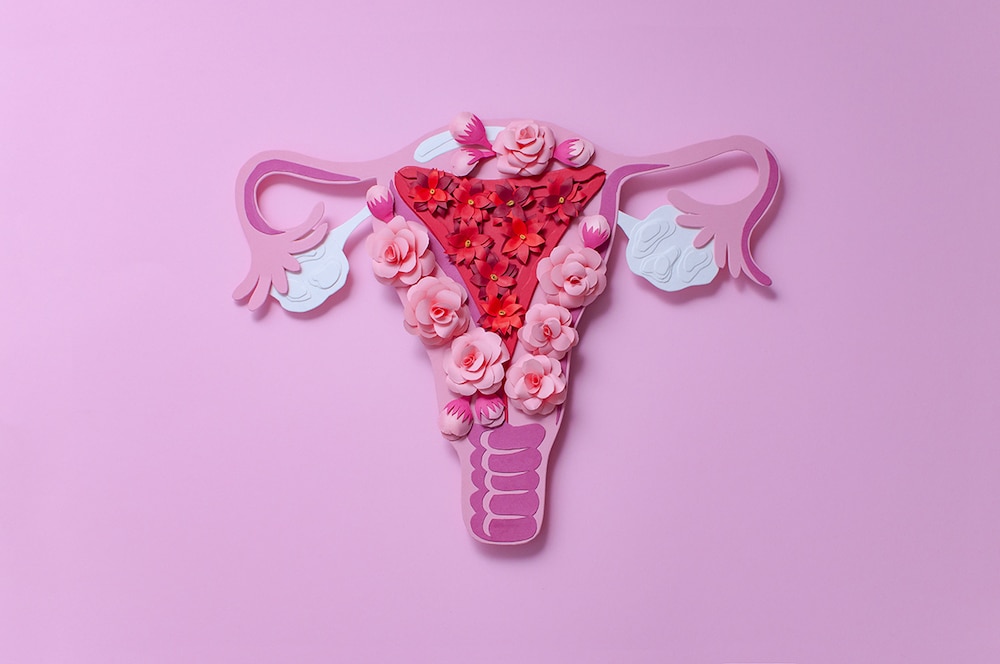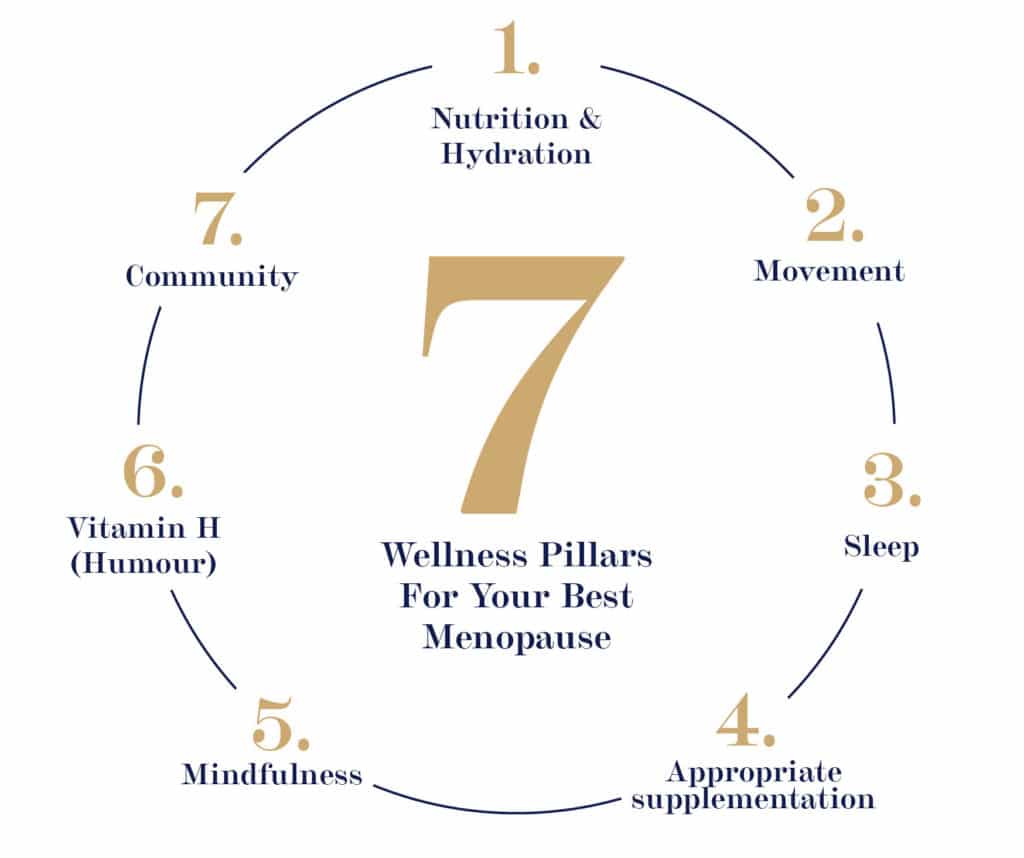Mythbusting Menopause | Four Things It IS, and Four Things It ISN’T

According to Ms Google, a lot of ladies search the question ‘when does menopause start?’
And Ms G knows everything right? Well, maybe not quite everything, but pretty close! So let us address this common query for you.
When Does Menopause Start?
To be honest, the question is something of a misnomer. It would be more helpful to ask when does perimenopause start because that’s when many of the hormonal shifts and symptoms begin.
The surprising aspect of this is that many intelligent, well-informed and savvy women don’t know to ask the question. Even if they ask their GP, they oftentimes won’t be provided with an answer as it’s not a large part of medical training.
That said, there is no definitive answer. Menopause itself occurs, on average, around the ages of 45-55. By definition, it takes place when your last period finishes but you won’t know this until 12 months later. Perimenopause comes about approximately 10 years before. There are a lot of ‘approximately’s’ in the equation because every woman has her own experience. Genetics, lifestyle and individual physiology all play a part.
What Is Menopause?
To understand the menopause transition we need to look at the foundations. Simplistically speaking menopause is the end of a woman’s fertility. The reproductive system shuts up shop and the hormones responsible for supporting pregnancy decline. However, hormonal changes begin years earlier. Issues begin in 80 percent of females because the sex hormones don’t depart gracefully, rather they make an erratic exit. It’s this fluctuating pathway that leads to both mental and physical symptoms.
There’s a lack of knowledge – by both medics and women – around menopause and there are plenty of myths swirling around. So let us clear some of them up for you.
Four Things It Is
1. The time when a female's reproductive years come to an end.
The lead-up – technically called perimenopause – is when the ovaries begin to gradually produce less estrogen until they stop producing eggs. A woman will probably still be getting her period, albeit irregularly and lighter or heavier in flow. It isn’t until she has had her last bleed that she is officially in menopause. This is a natural evolution as she moves from a child-bearing life stage through to post-menopause.
Related: What is menopause.
2. A longer-stay life transition.
Natural menopause occurs around the ages of 51/52 and a woman is then in post-menopause for the rest of her life. It forms the foundations of a new era in our lives. For some women, this equates to a new sense of liberation and freedom.
3. A universal experience, shared by an estimated 47 million new entrants each year.
As this paper found – using age 50 as a proxy – menopause is a time where both social and health needs change. We often need to make some holistic lifestyle adjustments to take care of our minds and bodies. When menopause occurs we become more susceptible to things like digestive disorders, insulin resistance, heart disease and osteoporosis. Furthermore, we may find ourselves less ‘driven’ and sometimes more emotional. Socially it can be a time when we find our voices. Many women say they learn to say no for the first time in their lives.
“Cut yourself some slack, I was very, very bad at cutting myself some slack. I’m learning to say no for the first time in my life.” Sam Baker, former editor of the UK’s Red magazine. Author of The Shift, How I (lost and) Found Myself After 40 – and you can too, and host of The Shift (on life after 40) podcast.
4. Not just a Baby Boomer Experience
At the time of writing, menopause is a stage of life encompassing Baby Boomers, GenX and Millennials. (The oldest millennials turned 40 in 2021.)
Four Things It Isn't
1. Something that happens when you turn 50. Boom! No more periods.
Unfortunately, menopause isn’t that predictable. Every woman’s process is different and no one can predict when an individual will begin to experience perimenopause.
The hormonal shifts involved can begin naturally as early as the late 30s or not until the 50s. Experiencing natural menopause between the ages of 40-45 is characterised as premature menopause. Family history, being a child of multiple pregnancy, smoking, being underweight and some autoimmune conditions have all been identified as possible causes.
When we’re talking about the human body there are always anomalies. As a case in point, loss of ovarian function can even begin earlier. This is known as primary ovarian insufficiency and the cause is usually unknown. It occurs in one in 100 females under the age of 40, one in 1000 under the age of 30, and one in 10,000 under 20.
Surgical intervention through chemotherapy and/or a full hysterectomy can also cause menopause to happen at an earlier age.
2. A health condition.
Menopause is a natural evolution and is something that will happen to every woman if she lives long enough. Dr Jen Gunter, author of The Menopause Manifesto, often referred to as the world’s most famous – and outspoken – gynaecologist says there is strong evidence to support the ‘grandmother hypothesis’.
The theory suggests that the post-menopausal life of women allows them to be able to help their daughters rear their young. “Ovaries aren’t tired or dried up. It’s a planned end of reproduction, and it’s part of societal functioning. You can’t really help your daughter who is having a baby if you’re looking after your own 6-month-old,” says Dr Gunter as reported on NBCnews.
3. An automatic passport to hot flushes, weight gain & the end of your sex life.
While hot flushes are well-known signs of peri/menopause they’re accompanied by nearly 40 other recognised symptoms. However, not everyone will experience all of the symptoms or, indeed, hot flushes.
Another misconception is that you’ll inevitably gain a lot of weight. It is common, yes, but it’s not irreversible and there are ways to manage it. It’s true that declining estrogen levels shift where fat is deposited and it tends to move from your hips and thighs to your abdomen. And because estrogen is present in fat cells it does like to accumulate. However, weight gain can be due to many other reasons, not just menopause. These include hormone imbalances (common during peri/menopause), reduced insulin sensitivity, thyroid issues, ageing, muscle loss, slower metabolism and being less active.
The third monkey in the room is the end of your sexual life. Like your body shape, your sensuality could alter and you may find you need to make adjustments. Many women say their libido lowers or vaginal dryness makes sex uncomfortable for them. The good news is there are steps you can take to regain the intimacy with your partner that you once enjoyed. Communication between you is all-important here.
4. Something you need to 'tough out'.
There is a lot you can do to manage perimenopause, menopause and post-menopause naturally. If you’re one of the 80 percent of women who experience frustrating and upsetting symptoms don’t grin and bear it. Support systems (like ourselves) are becoming more commonplace and research is showing that holistic steps really do make a difference. We offer 40+ and 55+ for this reason. They’re natural, safe and scientifically proven. That said, taking a capsule won’t fix your overall nutrition or lifestyle habits. Many of us need to make some changes to our habits because we can’t get away with what we used to. It’s about the big picture.
It’s why we created our evidence-backed 7 Wellness Pillars For Your Best Menopause.










